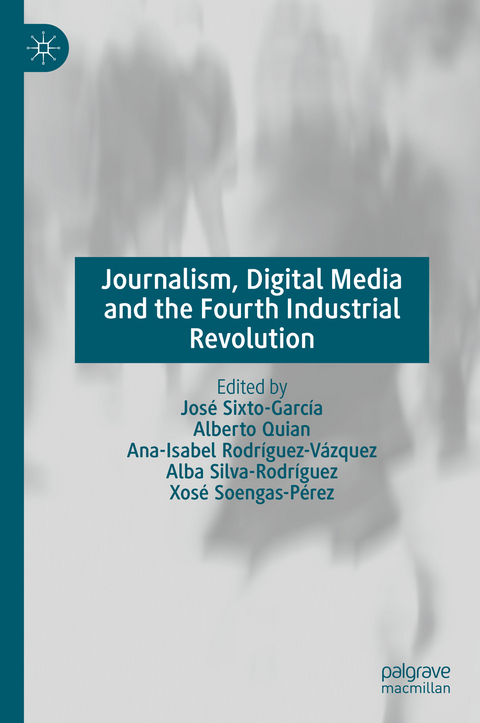
Journalism, Digital Media and the Fourth Industrial Revolution
Springer International Publishing (Verlag)
978-3-031-63152-8 (ISBN)
The Fourth Industrial Revolution, also known as Industry 4.0, is the fourth most important industrial stage that has occurred since the beginning of the Industrial Revolution in the 18th century. This new revolution is characterized by combining cutting-edge production techniques with intelligent systems that integrate with organizations and people. Communication and journalism, especially digital media, face the challenge of integrating emerging technologies and practices or in-test or developing technologies into companies and communicative products, that are breaking down the boundaries between physical, digital, and biological. This collection analyzes and reflects on the impact of Industry 4.0 on journalism and digital media.
The collection is split into three parts. The first part analyzes the emergence of centralized and decentralized networks and their impact on digital media. Specifically, it delves into the role of cryptographic journalism and the impactof free and collaborative networks in the fediverse to fight against disinformation and censorship, as well as to promote data and metadata journalism. In a second part, the "innovation of innovation" is explored with the aim of continuing to create products that satisfy the needs of 4.0 audiences. This is where the challenges and opportunities offered by the metaverse, content automation technologies, the impact of the Internet of Things on journalism, labs, the application of R+D+I to journalism, and collaborative encounters between journalists to develop highly innovative proposals are explored. Finally, in the third part of the book, the emergence of new communicative and journalistic actors in the 4.0 context is reviewed. Examples include start-ups, spin-offs or other entrepreneurial initiatives, communication of knowledge transfer, new financing models, and outsourcing of tasks, new proposals for newsgames, or the impact of artificial intelligence in journalism practices. In addition, a final chapter is dedicated to exploring the new professional skills needed for journalists in this Fourth Industrial Revolution.
José Sixto-García is Professor of Journalism at the Department of Communication Sciences of the University of Santiago de Compostela.
Alberto Quian is Assistant professor of Journalism at Universidade de Santiago de Compostela (USC), ex-adjunct professor of Journalism at Universidad Carlos III de Madrid (UC3M) and Universitat Oberta de Catalunya (UOC).
Ana-Isabel Rodríguez-Vázquez is Dean of the Communication Science Faculty at the University of Santiago de Compostela (Spain) and Professor of Audiovisual Communication.
Alba Silva-Rodríguez is Professor of Journalism at the Department of Communication Sciences at Universidade de Santiago de Compostela.
Xosé Soengas-Pérez is Head of Department of Communication Sciences at the University of Santiago de Compostela and Full Professor of Audiovisual Communication and Advertising.
Part 1: Network emergence and impact on digital media.- Chapter 1: Decentralized networks as a tool to fight disinformation and censorship: Fediverse and free, collaborative, and open networks.- Chapter 2: Centralized networks for journalism in the Fourth Industrial Revolution:The platform's role.- Chapter 3: Intelligent networks for real-time data and metadata: solutions for tracking disinformation.- Chapter 4: Updating the imaginary of the networked fourth estate: Cryptography and citizen leaks.- Chapter 5: The fruition of news in the Fourth Industrial Revolution.- Part 2: 'Innovating innovation' to satisfy increasingly digital audiences.- Chapter 6: Challenges of the metaverse for news production and consumption.- Chapter 7: Technologies for content automation.- Chapter 8: Impact of the Internet of Things on journalism: a necessity for journalists?.- Chapter 9: R+D+I for the journalism of the third millennium.- Chapter 10: Challenges and opportunities for journalistic innovation in the big data era: evolution and role of the media labs.- Chapter 11: Hackathon and journalism: looking for the 'innovation of innovation'.- Chapter 12: High-tech journalism in Spain: Results of the first decade.- Part 3: New communicative and journalistic actors.- Chapter 13: What is the role that Informative and Communicative Apps and Platforms play? Do they empower citizens to make decisions? Or do they only make them feel better informed?.- Chapter 14: Transfer communication: From company to media and from media to the society.- Chapter 15: Limits and possibilities of artificial intelligence in the fields of citizen journalism, activism and human rights monitoring.- Chapter 16: Journalistic actors in a gamified media context.- Chapter 17: Journalists working with AI.- Chapter 18: Professional competencies for journalism in the Fourth Industrial Revolution.
| Erscheinungsdatum | 05.09.2024 |
|---|---|
| Zusatzinfo | XXIII, 274 p. |
| Verlagsort | Cham |
| Sprache | englisch |
| Maße | 155 x 235 mm |
| Themenwelt | Sozialwissenschaften ► Kommunikation / Medien ► Journalistik |
| Schlagworte | cryptographic journalism • decentralized networks • Digital Media • Fediverse • fourth industrial revolution • Industry 4.0 • innovative journalism • R+D+I |
| ISBN-10 | 3-031-63152-8 / 3031631528 |
| ISBN-13 | 978-3-031-63152-8 / 9783031631528 |
| Zustand | Neuware |
| Haben Sie eine Frage zum Produkt? |
aus dem Bereich


